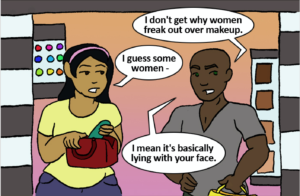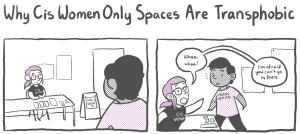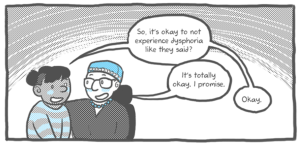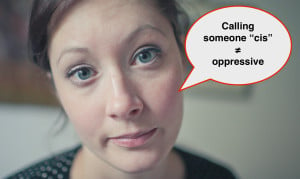Hey y’all this is another video I’m doing with Everyday Feminism, which is a website dedicated to helping you break down and stand up to everyday oppression. And, in this video, I want to talk about the gender disparity in mental health diagnoses.
So, first I want to say, as I have in past videos on topics discussing academic studies, that this isn’t an issue that only affects cis-people.
Trans and non-binary people are affected by these issues of mental health diagnosis on a very deep level.
Not only have gender-related disorders been used to medicalize and oppress trans and non-binary identities, but trans and non-binary people are often treated extremely poorly by society – a factor which, as I’ll discuss, affects one’s mental health.
So, while many of the studies I’ve found discussing gender disparity in mental health diagnosis only look at men and women – cis men and women, overlooking trans men, trans women, and all non-binary people – this is an issue that affects all of us, albeit different groups will be affected differently.
So, for the purposes of this video I want to focus specifically on more common mental disorders, like depression and anxiety, and why there are differences found in who is diagnosed and how often.
Then, I can then use the small data that there is regarding trans and gender-diverse people to make judgments about how they might fit in to the trends of diagnosis.
More common mental disorders like depression, anxiety, and somatic complaints (which focus on physical symptoms like pain or fatigue) are predominantly diagnosed in women.
Depression is the most common women’s health problem and is either more persistent in women than men, or it’s more diagnosed in women. Or both. It’s not really clear until more research is done. What is clear is that women are overrepresented when it comes to certain mental health diagnoses.
These disorders, like depression and anxiety, are likely related to interconnected risk factors, including gender roles and gender-based violence, being socioeconomically disadvantaged, and the constant responsibility for the care of other people.
Thinking about women at the intersections of all kinds of other oppressed identities makes it easy to see why women might be at a higher risk of depression or anxiety based on this.
Based on the socially enforced responsibility of taking care of family, the alarming rates of gender-based violence against women, and the pressure of conforming to a gender role which you may or may not identify with, or which otherwise restricts your movement in life – it’s not difficult to grasp why women might be at a higher risk of these disorders.
While in my personal experience, depression and anxiety are likely the result of my genes (thanks dad!) – it’s true that these mental health disorders are often intricately connected to the other factors.
If they’re not the initial cause, then they’re exasperating what is genetically there.
This seems totally right to me. I mean, it might be in my genes to have anxiety and depression, but external factors have very real effects on my ability to manage my symptoms and the severity of the symptoms themselves.
This is, I think, part of the explanation of why women are predominantly diagnosed with these kinds of mental disorders. It also becomes easy to understand why research done on transgender youth, many of whom lack validation of their gender, experience mental health issues.
Lack of validation is a very serious problem, and it’s far from the only one affecting trans youth.
Considering what we’ve learned about women’s gender roles affecting their mental health, it seems painfully obvious that people whose identities challenge the gender binary will face even more extreme challenges regarding the roles placed on them.
These factors will likely lead to a higher risk of depression and anxiety.
There might be another side to this, as well. Gender bias on the part of healthcare providers and on the part of the patients themselves is affecting the diagnoses.
Doctors are less likely to diagnose depression in men than in women even when they score the same on the diagnostic tests. So, why would that be?
Part of the reason might be that women are more likely to internalize emotions, making us more withdrawn and obviously depressed than men who are more likely to externalize their emotions leading to aggressive and impulsive behavior.
I think it’s a complex interplay going on between gender roles (like the idea that men are inherently strong and aggressive and women are emotional and soft by nature) and how doctors are recognizing and diagnosing these symptoms.
That said, doctors are also more likely to diagnose depression in women than in men even when we have identical symptoms. So, if the symptoms are the same, why aren’t the diagnoses?
My guess is that doctors have a gender bias that alters the way they perceive these symptoms.
Women have historically been very closely connected to mental disorder diagnosis – from the “moving womb” theory of hysteria to the connections thought to be between breast milk and insanity – it’s really not that surprising that doctors are more readily diagnosing women with these mental disorders.
And considering the recent and current diagnosing of trans people with mental disorders as a way to label and medicalize their valid identities, this is an aspect of trans and non-binary health that needs serious attention and work.
Doctors needs to not only challenge the implicit bias they might have regarding cis men and women, but they also have a responsibility to do better regarding gender-diverse patients. This is a complex topic, though, that deserves its own vide.
And, again, it probably isn’t the whole story either.
Another aspect to consider is there’s also a difference in who seeks help in the first place, and where they seek it. Women are more likely to seek help and disclose their mental health struggles to their primary physician, while men are more likely to seek out specialists or use inpatient care.
This seems, again, obviously related to gender stereotypes regarding emotional vulnerability, which socially stigmatizes men who seek help, making them less likely to report to their family doctor and more likely to seek emergency help when things have progressed beyond their control.
As someone who is deeply invested in mental health advocacy, and as someone who struggles with my mental health personally, I think it’s interesting and important for us to question the norms of these disorders and their diagnoses.
Part of it, I think, has to do with the intersection of oppressive factors that make being a woman, or gender minority, hard.
Another part has to do with the gender roles of male strength and lack of emotional vulnerability, and women’s role as emotionally fragile.
Yet, another part has to do with the way doctors are diagnosing – whether that’s due to their training in med school or their own implicit bias, it’s likely that gender is a factor at play in this discrepancy.
In no way does this video cover the vast differences in mental health diagnosis across men and women, let alone all of the gender-diverse people out there.
But I hope it has given you some pause to think about why you might feel uncomfortable asking for help, or why it seems like almost all the women you know are struggling with mental health.
It’s a complicated issue and one that needs a lot more study, but I think the more we break down the gender binary, the more men will become comfortable expressing their vulnerabilities, the less women will feel weighed down by their gender roles, and the more trans and non-binary people will be able to access healthcare they need and have a right to.
The more we fight against gender-based violence and other factors which place women (especially women of color, disabled women, and poor women) and gender minorities (especially trans women of color) at a disadvantage, the better off all of our mental health will be.
Obviously, mental health is a health issue and it’s not one that can be wholly solved by fixing social factors. But we are social animals, and we exist in a society that is oppressive and cruel. And it’s important that we notice what that’s doing to our mental health so we can support each other and do everything we can to fix it.




















